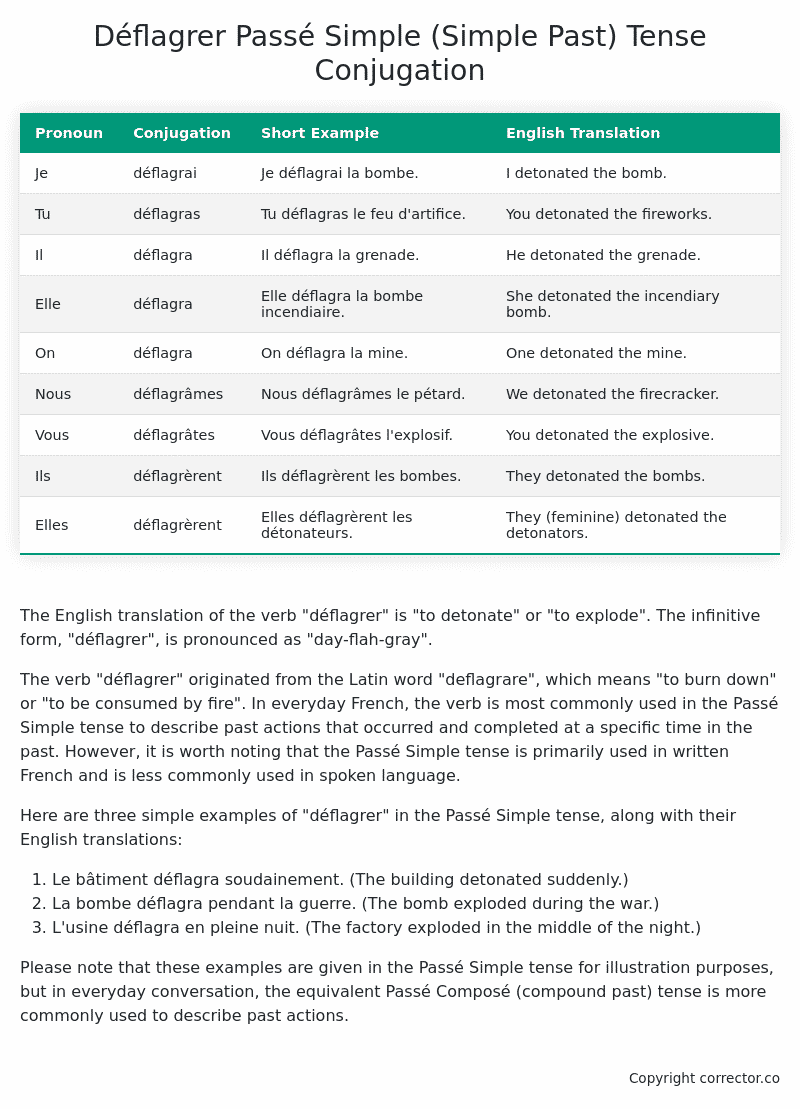Passé Simple (Simple Past) Tense Conjugation of the French Verb déflagrer
Introduction to the verb déflagrer
The English translation of the verb “déflagrer” is “to detonate” or “to explode”. The infinitive form, “déflagrer”, is pronounced as “day-flah-gray”.
The verb “déflagrer” originated from the Latin word “deflagrare”, which means “to burn down” or “to be consumed by fire”. In everyday French, the verb is most commonly used in the Passé Simple tense to describe past actions that occurred and completed at a specific time in the past. However, it is worth noting that the Passé Simple tense is primarily used in written French and is less commonly used in spoken language.
Here are three simple examples of “déflagrer” in the Passé Simple tense, along with their English translations:
- Le bâtiment déflagra soudainement. (The building detonated suddenly.)
- La bombe déflagra pendant la guerre. (The bomb exploded during the war.)
- L’usine déflagra en pleine nuit. (The factory exploded in the middle of the night.)
Please note that these examples are given in the Passé Simple tense for illustration purposes, but in everyday conversation, the equivalent Passé Composé (compound past) tense is more commonly used to describe past actions.
Table of the Passé Simple (Simple Past) Tense Conjugation of déflagrer
| Pronoun | Conjugation | Short Example | English Translation |
|---|---|---|---|
| Je | déflagrai | Je déflagrai la bombe. | I detonated the bomb. |
| Tu | déflagras | Tu déflagras le feu d’artifice. | You detonated the fireworks. |
| Il | déflagra | Il déflagra la grenade. | He detonated the grenade. |
| Elle | déflagra | Elle déflagra la bombe incendiaire. | She detonated the incendiary bomb. |
| On | déflagra | On déflagra la mine. | One detonated the mine. |
| Nous | déflagrâmes | Nous déflagrâmes le pétard. | We detonated the firecracker. |
| Vous | déflagrâtes | Vous déflagrâtes l’explosif. | You detonated the explosive. |
| Ils | déflagrèrent | Ils déflagrèrent les bombes. | They detonated the bombs. |
| Elles | déflagrèrent | Elles déflagrèrent les détonateurs. | They (feminine) detonated the detonators. |
Other Conjugations for Déflagrer.
Le Present (Present Tense) Conjugation of the French Verb déflagrer
Imparfait (Imperfect) Tense Conjugation of the French Verb déflagrer
Passé Simple (Simple Past) Tense Conjugation of the French Verb déflagrer (You’re reading it right now!)
Passé Composé (Present Perfect) Tense Conjugation of the French Verb déflagrer
Futur Simple (Simple Future) Tense Conjugation of the French Verb déflagrer
Futur Proche (Near Future) Tense Conjugation of the French Verb déflagrer
Plus-que-parfait (Pluperfect) Tense Conjugation of the French Verb déflagrer
Passé Antérieur (Past Anterior) Tense Conjugation of the French Verb déflagrer
Futur Antérieur (Future Anterior) Tense Conjugation of the French Verb déflagrer
Subjonctif Présent (Subjunctive Present) Tense Conjugation of the French Verb déflagrer
Subjonctif Passé (Subjunctive Past) Tense Conjugation of the French Verb déflagrer
Subjonctif Imparfait (Subjunctive Imperfect) Tense Conjugation of the French Verb déflagrer
Subjonctif Plus-que-parfait (Subjunctive Pluperfect) Tense Conjugation of the French Verb déflagrer
Conditionnel Présent (Conditional Present) Tense Conjugation of the French Verb déflagrer
Conditionnel Passé (Conditional Past) Tense Conjugation of the French Verb déflagrer
Conditionnel Passé II (Conditional Past II) Tense Conjugation of the French Verb déflagrer
L’impératif Présent (Imperative Present) Tense Conjugation of the French Verb déflagrer
L’impératif Passé (Imperative Past) Tense Conjugation of the French Verb déflagrer
L’infinitif Présent (Infinitive Present) Tense Conjugation of the French Verb déflagrer
L’infinitif Passé (Infinitive Past) Tense Conjugation of the French Verb déflagrer
Le Participe Présent (Present Participle) Tense Conjugation of the French Verb déflagrer
Le Participe Passé (Past Participle) Tense Conjugation of the French Verb déflagrer
Struggling with French verbs or the language in general? Why not use our free French Grammar Checker – no registration required!
Get a FREE Download Study Sheet of this Conjugation 🔥
Simply right click the image below, click “save image” and get your free reference for the déflagrer Passé Simple tense conjugation!

Déflagrer – About the French Passé Simple (Simple Past) Tense
Formation
Usage
Narration
Historical Context
Interactions with other tenses
Passé Composé
Imparfait
Conditional and Subjunctive
Summary
I hope you enjoyed this article on the verb déflagrer. Still in a learning mood? Check out another TOTALLY random French verb conjugation!


